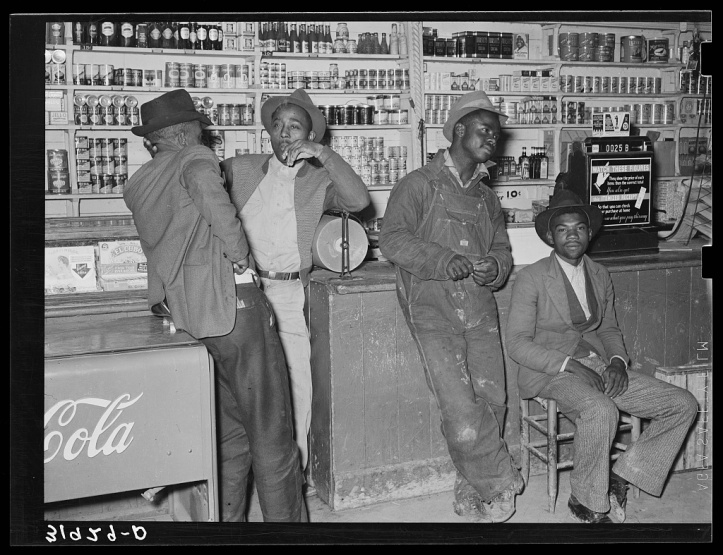
James Green Carson was a slave owner. He owned at least 3 plantations in Louisiana and Mississippi with hundreds of slaves. Carson and his family supported the Confederacy and he most likely paid someone else to fight in his place when conscription was enacted. Three of his four sons fought for the Confederacy and at least one of them took a slave with him to the front lines as a man servant.
In my Master’s thesis, I pretty much-ignored slavery as a part of Katherine Carson Breckinridge’s story. I was always more interested in the Russia years but as her biographer, I had to do some research and genealogy of her parents and grandparents. She married a man whose father was a Confederate general and Secretary of War for the Confederacy. I never explored her beliefs or her husband’s beliefs or her parents’ beliefs about slavery. I looked at primary sources documenting the Carsons’ slave ownership but I never studied them.
My white privilege and the narrative as I knew it clouded my research and my own bias allowed me to ignore the story of enslavement at Airlie and Carson’s other plantations. After the murder of George Floyd in May 2020 and the Black Lives Matter protest in the summer of 2020, I began following a number of historians and living history interpreters on Instagram to better understand how to write about the Carsons and their slave-owning past. I began reexamining the historiography I’d been taught when it came to slavery. I sought out (and continue to seek out) new history on slavery and how it affects everything in this country.
I started thinking about James Green Carson, the plantations, and the people he owned. I’d read Kate Stone’s diary (a contemporary and neighbor of the Carsons in Louisiana and later in Texas). I read her flip-flopping opinions on the Confederacy and slavery. In her diary, Kate Stone is shocked when a slave runs away. She is appalled when after the white families flee Carroll Parish as the Union Army advances leave the region, the group of slaves take over the “big house” and presume to act like the master and his family.
For years I thought about another project. One tracing the slaves owned by Carson. What happened to them after Emancipation? Did they stay in the region? Did they continue to work for the Carson family as sharecroppers? What happened to the descendants of Carson’s slaves in the 20th century? During World War I, the Flood of 1927 or the Great Migration?
But with the murder of George Floyd and the protests throughout the country, I started reading and rereading secondary sources about slavery and the Lost Cause and how we got here – to this moment in time where change is possible. Then I received an email from a gentleman in New York. He’d seen my blog and was looking to find some of his relatives – people listed on the 1880 Census as living at a place called Airlie.
In my earlier research, I’d looked at the Census to find Katherine Breckinridge but by 1880 she was married to Clifton Rodes Breckinridge and they were living in Pine Bluff, Arkansas. I’d never looked at the census for KCB’s siblings still living in northeastern Louisiana and northwestern Mississippi let alone a place name of Airlie in the census.
It has been almost a year since George Floyd was murdered. It has taken me this long to decide to publish this post. I received another email today from a descendant of the Carson slaves looking for information on her relatives. It feels like the right time to start publishing the information I have collected.
I have a very limited platform but I don’t want to contribute to the issue by remaining silent. The narrative of American history is a white narrative. All of it – black, indigenous, immigrant – has been told through a lens of whiteness. And as happened with my interpretation of Katherine Carson Breckinridge’s life, white privilege and white bias have influenced the way American history is told.
I am by no means an authority or the definitive source. Like with my other blog posts, I will share what I discover as I discover it. Please be patient with me as I explore this new material and adjust to this new view of history. I will probably use the wrong language at times. I will probably seem confused at times. But I will be honest about my struggles.

Do you have any additional information on the slaves who lives on Airlie Plantation? I have traced back my dad’s side of the family to Airlie but it seems that I will have to go to MD or TX to get more info on its inhabitants.
LikeLiked by 1 person
Jeremy – I’m sorry I didn’t get back to you sooner. I have very limited information on the slaves at Airlie. I know that Sutfield is a surname that is connected to the Carsons. Have you looked at the 1870 or 1880 US Census for Ward 1 & 2 of Carroll Parish/East Carroll Parish, Louisiana? Those are the first censuses to count everyone in the United States and former enslaved persons are listed. In the 1880 Census, Airlie is listed as a place name. I can’t be sure that all the people listed there where formerly enslaved but it is a start. I haven’t looked at the 1870 census yet. Another place name to look for in the Census is Alsatia (which is still a place name in that parish). Also Transylvania might be a good search term.
I have looked at the Record Books you might be referring to from Texas. Part of the “Records of ante-bellum Southern plantations from the Revolution through the Civil War.” Those records are available on microfilm and some repositories will Inter-Library Loan a reel or two to our public library. But I will also email you the scans I have of the pages from the Airlie record books. If I remember correctly, names aren’t listed – just gender, age, and value.
I have some copies of letters between Dr. Carson and his wife and other family members from the pre-war period. But little to no mention of enslaved persons. Mrs. Carson keep a diary for a few years after the war ended (1867 to 1871 I think) and there are few mentions of enslaved persons in there. I’ll look for that and email you that info as well.
I hope this is helpful.
LikeLike
Hello,
I am a historian and I am very interested in learning all I can about slavery. I don’t like the idea of slavery but it did happen and it is part of our history. I did my thesis on a plantation that was very active in the mid 1800’s in northeast Arkansas. My 3 grown children are actually descendants of Dr. James G. Carson. I am working on the Carson genealogy for my ex-husband. I am just getting started so I have a lot of work to do. You keep up the good work! Thanks.
Brenda Carson
roseladyone@yahoo.com
Little Rock, AR
LikeLike
Hi Brenda – I’m sorry I missed this comment! I’m always excited to connect with KCB’s descendants. Assuming your kids are descendants of the Carson sons – which one?
There’s a lot out there about the Carsons. And If you haven’t found already, John Q. Anderson did a lot of work on J G Carson and his son Joseph Carson. Anderson was a historian in the traditional sense and his articles are a bit more glorification of his subjects than real character studies. His papers are at LSU. There is also some Carson papers at the Tennessee State Library and Archives has a few things (literally like 3 pages in one folder). William Waller Carson’s papers are at UT Knoxville and there is also a Carson Family Papers collection at the Filson in Louisville (or is it Lexington?). And there are really ealry letters between JG Carson and his wife at Library of Congress (part of the Breckinridge Family Papers). I’ve not looked them closely but they are from the 1830s and 1840s.
Best of luck on your research. Please keep me posted and let me know if I can do anything to help. My day job is at the Butler Center.
H
LikeLike